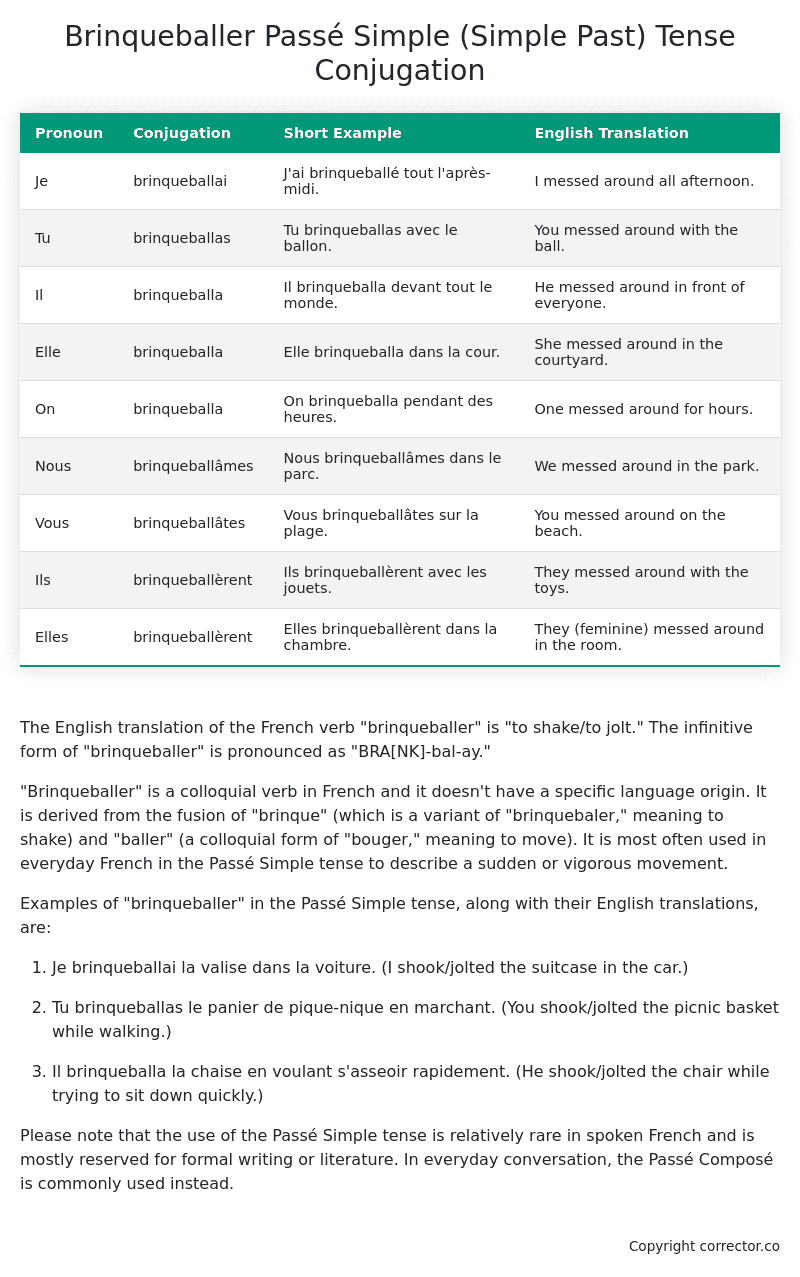Passé Simple (Simple Past) Tense Conjugation of the French Verb brinqueballer
Introduction to the verb brinqueballer
The English translation of the French verb “brinqueballer” is “to shake/to jolt.” The infinitive form of “brinqueballer” is pronounced as “BRA[NK]-bal-ay.”
“Brinqueballer” is a colloquial verb in French and it doesn’t have a specific language origin. It is derived from the fusion of “brinque” (which is a variant of “brinquebaler,” meaning to shake) and “baller” (a colloquial form of “bouger,” meaning to move). It is most often used in everyday French in the Passé Simple tense to describe a sudden or vigorous movement.
Examples of “brinqueballer” in the Passé Simple tense, along with their English translations, are:
-
Je brinqueballai la valise dans la voiture.
(I shook/jolted the suitcase in the car.) -
Tu brinqueballas le panier de pique-nique en marchant.
(You shook/jolted the picnic basket while walking.) -
Il brinqueballa la chaise en voulant s’asseoir rapidement.
(He shook/jolted the chair while trying to sit down quickly.)
Please note that the use of the Passé Simple tense is relatively rare in spoken French and is mostly reserved for formal writing or literature. In everyday conversation, the Passé Composé is commonly used instead.
Table of the Passé Simple (Simple Past) Tense Conjugation of brinqueballer
| Pronoun | Conjugation | Short Example | English Translation |
|---|---|---|---|
| Je | brinqueballai | J’ai brinqueballé tout l’après-midi. | I messed around all afternoon. |
| Tu | brinqueballas | Tu brinqueballas avec le ballon. | You messed around with the ball. |
| Il | brinqueballa | Il brinqueballa devant tout le monde. | He messed around in front of everyone. |
| Elle | brinqueballa | Elle brinqueballa dans la cour. | She messed around in the courtyard. |
| On | brinqueballa | On brinqueballa pendant des heures. | One messed around for hours. |
| Nous | brinqueballâmes | Nous brinqueballâmes dans le parc. | We messed around in the park. |
| Vous | brinqueballâtes | Vous brinqueballâtes sur la plage. | You messed around on the beach. |
| Ils | brinqueballèrent | Ils brinqueballèrent avec les jouets. | They messed around with the toys. |
| Elles | brinqueballèrent | Elles brinqueballèrent dans la chambre. | They (feminine) messed around in the room. |
Other Conjugations for Brinqueballer.
Le Present (Present Tense) Conjugation of the French Verb brinqueballer
Imparfait (Imperfect) Tense Conjugation of the French Verb brinqueballer
Passé Simple (Simple Past) Tense Conjugation of the French Verb brinqueballer (You’re reading it right now!)
Passé Composé (Present Perfect) Tense Conjugation of the French Verb brinqueballer
Futur Simple (Simple Future) Tense Conjugation of the French Verb brinqueballer
Futur Proche (Near Future) Tense Conjugation of the French Verb brinqueballer
Plus-que-parfait (Pluperfect) Tense Conjugation of the French Verb brinqueballer
Passé Antérieur (Past Anterior) Tense Conjugation of the French Verb brinqueballer
Futur Antérieur (Future Anterior) Tense Conjugation of the French Verb brinqueballer
Subjonctif Présent (Subjunctive Present) Tense Conjugation of the French Verb brinqueballer
Subjonctif Passé (Subjunctive Past) Tense Conjugation of the French Verb brinqueballer
Subjonctif Imparfait (Subjunctive Imperfect) Tense Conjugation of the French Verb brinqueballer
Conditionnel Présent (Conditional Present) Tense Conjugation of the French Verb brinqueballer
Conditionnel Passé (Conditional Past) Tense Conjugation of the French Verb brinqueballer
Conditionnel Passé II (Conditional Past II) Tense Conjugation of the French Verb brinqueballer
L’impératif Présent (Imperative Present) Tense Conjugation of the French Verb brinqueballer
L’impératif Passé (Imperative Past) Tense Conjugation of the French Verb brinqueballer
L’infinitif Présent (Infinitive Present) Tense Conjugation of the French Verb brinqueballer
L’infinitif Passé (Infinitive Past) Tense Conjugation of the French Verb brinqueballer
Le Participe Présent (Present Participle) Tense Conjugation of the French Verb brinqueballer
Le Participe Passé (Past Participle) Tense Conjugation of the French Verb brinqueballer
Struggling with French verbs or the language in general? Why not use our free French Grammar Checker – no registration required!
Get a FREE Download Study Sheet of this Conjugation 🔥
Simply right click the image below, click “save image” and get your free reference for the brinqueballer Passé Simple tense conjugation!

Brinqueballer – About the French Passé Simple (Simple Past) Tense
Formation
Usage
Narration
Historical Context
Interactions with other tenses
Passé Composé
Imparfait
Conditional and Subjunctive
Summary
I hope you enjoyed this article on the verb brinqueballer. Still in a learning mood? Check out another TOTALLY random French verb conjugation!


